In This Issue:
– President’s Corner
– Announcements
– IPLAC’s New Mission, Vision, and Values
– Volunteer for the USPTO Pro Bono Program
– Recaps of Past Events:
– Analyzing 35 U.S.C. § 112 Requirements, Guidelines & Tips – November 30, 2021
– Virtual Book Club Discussion on Borderlands/La Frontera: The New Mestiza – December 3, 2021
– The IPLAC 2021 Annual IP Symposium – December 7, 2021
– Speed Networking Sessions
– Trade Secrets Summit, Part 2 – December 13, 2021
– Special Feature: Get to Know IPLAC DEI Committee Co-Chair Caleb Norris!
– Special Feature: Get to Know IPLAC Litigation Committee Vice-Chair David Donoghue!
President’s Corner:
Dear IPLAC Members,
As we celebrate the holidays this season, I want to extend my warmest wishes to you. May this time be filled with joy and good health for you and your loved ones.
As IPLAC closes out 2021, we continue to offer best-in-class virtual programming and opportunities to stay connected to one another. The IPLAC Annual Symposium was a success, as was the Trade Secrets Seminar. A big, warm thank you to Committee leads Jim Murraff and Matt Marrone, along with Viren Soni, Kwan Lee, and Margot Wilson for their work on the Symposium, as well as Debbie Berman and Brad Lane for their Trade Secrets leadership. I also want to thank Copyright Vice-Chair Brittany Kaplan for facilitating a fireside chat with Professor Edward Lee on NFTs, which was insightful. These are just some of the many events IPLAC hosted in November and December, so hats off to all of our leaders for helping IPLAC members stay connected and engaged this past fall.
As we enter 2022, we will continue with virtual programming and will monitor Omicron and local guidelines.
Wishing you and your family a healthy and happy New Year!
Warmly,
Erin Lothson
137th IPLAC President
erin.lothson@uber.com
Announcements
1. IPLAC’s New Mission, Vision, and Values
IPLAC and the Board of Managers are excited to share IPLAC’s Mission, Vision, and Values. We invite you to click here to read it on our website!
2. Volunteer for the USPTO Pro Bono Program!
Patent practitioners are uniquely positioned to help financially under-resourced inventors and small businesses file and prosecute patent applications. By volunteering with the USPTO Pro Bono Program, you may help those who cannot otherwise afford to do so engage in our innovation economy.
Patent practitioners can volunteer through their local patent pro bono programs. Please consult Information for Volunteer Attorneys or the USPTO Pro Bono Program Website for more information on how to volunteer. The local patent pro bono programs screen patent applicants using criteria that include: (1) household income; (2) knowledge of the patent system; and (3) possession of an actual invention (not merely an idea) to ensure that each inventor or small business is a good candidate for assistance.
Recaps of Past Events:
3. Analyzing 35 U.S.C. § 112 Requirements, Guidelines & Tips – November 30, 2021
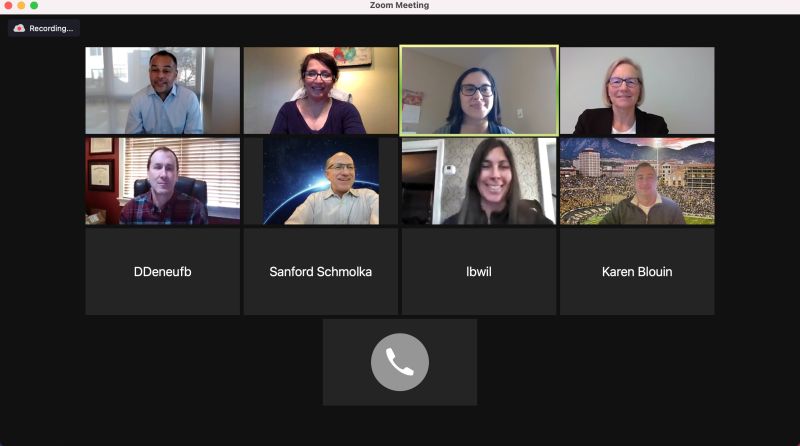
The IPLAC Patent Agents Committee extends much gratitude to Paul Stephens and Stephanie Vavra for presenting “35 U.S.C. § 112 – Updates, Reminders, and Practice Tips.” Their presentation included topics such as a review of 35 U.S.C. § 112, with reminders of both the pre- and post-AIA language, and practice tips in relation to best mode disclosure, real and prophetic examples, and enablement in the written description. The speakers shared their experiences around what difficulties have arisen in prosecution in these areas, and provided suggestions of what not to do in order to avoid these deep pitfalls. Subject matters covered ranged from biotech to software practice. Thank you to all who took the time to attend.
4. Virtual Book Club Discussion on Borderlands/La Frontera: The New Mestiza – December 3, 2021
On December 3, 2021, the DE&I Committee hosted a virtual book club discussion on Borderlands/La Frontera: The New Mestiza by Gloria E. Anzaldúa. During the intimate conversation, we discussed major themes of the semi-autobiographical book and how we can apply these principles to the current IP workplace. The themes of code-switching, gender identity, and negotiating seemingly competing identities – such as being a lesbian and a spiritual Catholic – were central to the conversation.
Attendees also referred to a previous IPLAC event (June’s Pride Panel hosted by the DE&I Committee), during which we discussed how coming out in the workplace has evolved from an avoided topic to law firms intentionally creating LGBTQ+ affinity groups. As a takeaway, the group agreed that in the IP workplace, allies should continue to champion institutional changes that allow professionals with non-heteronormative identities to flourish.
5. The IPLAC 2021 Annual IP Symposium – December 7, 2021
IPLAC and the Symposium Committee held the Annual IP Symposium on December 7, 2021. Jim Muraff of McDonald Hopkins and Matt Marrone of McAndrews, Held & Malloy served as Co-Chairs, and Viren Soni of Accenture served as Vice Chair in organizing the event. Kwanwoo Lee of Marshall Gerstein & Borun and Margot Wilson of McDonnell Boehnen Hulbert & Berghoff assisted as well.
The first session, the Online Trademark Policing Panel, included Eric W. Gallender, Senior Counsel, Marketing and Intellectual Property, McDonald’s Corporation; Selena Spritz, Senior Director & Managing Counsel, Retail & IP Legal Group, Walgreen Co.; and Colin O’Brien, UDRP Panelist for WIPO and Partner, Latimer LeVay Fyock LLC, and was moderated by Kara Smith, Neal, Gerber & Eisenberg LLP. The discussion can be summarized as follows: due to the pandemic, online activity has thrived, but so have bad actors infringing trademarks or domain names. Some organizations combat online counterfeit activity by proactively using technology like artificial intelligence to protect brands. Others have taken down 3rd party food delivery sites that fraudulently associate themselves with well-known restaurants. To combat online bullying such as registering domain names confusingly similar to actual legitimate domain names, some large organizations have filed UDRP complaints to take down these domain names.
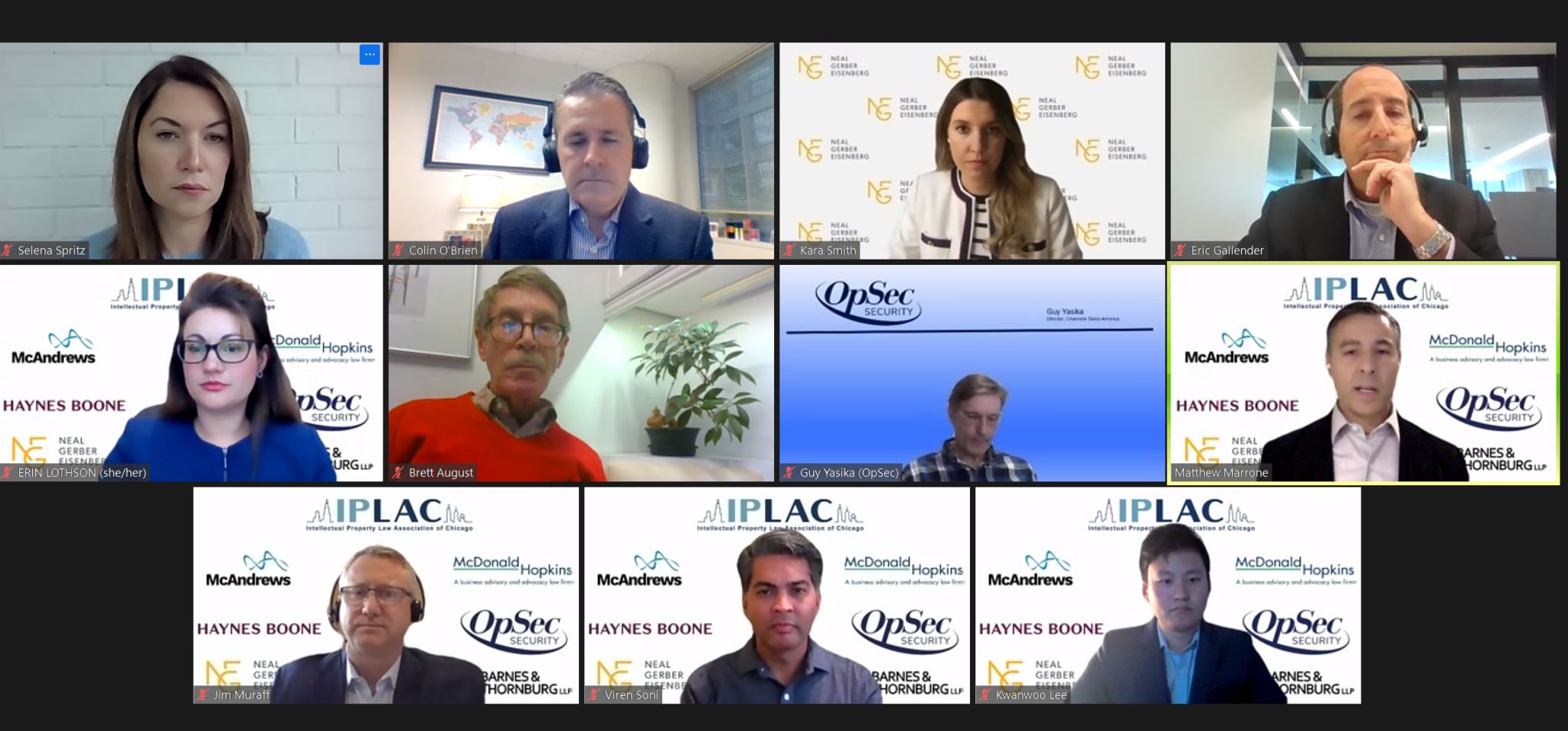
The second session, the TTAB Fireside Chat, included Judge Cindy Greenbaum, Administrative Trademark Judge, Trademark Trial and Appeal Board; Jennifer Elgin, Interlocutory Attorney, Trademark Trial and Appeal Board, and was hosted by Jessica A. Ekhoff, Pattishall, McAuliffe, Newbury, Hilliard & Geraldson LLP. The discussion can be summarized as follows: various roles of the TTAB were discussed, including judges and interlocutory attorneys, and their day-to-day activities. TTAB judges work in panels of three, while interlocutory attorneys work individually on assignments from their managing interlocutory attorney. Frequent issues addressed by TTAB judges and interlocutory attorneys include a rising number of failure to function cases, as well as procedural issues, some of which do not have precedential cases. Some advice offered by the panel when arguing at the TTAB include: (1) stick to what is in the record and start with your strongest evidence; (2) be careful to not inadvertently say something that hurts your case; (3) don’t make a new argument or present any evidence that is not in the record, and (4) if the case is complicated (legally and/or factually), explain and clarify the record, but be careful not to add anything to the record.
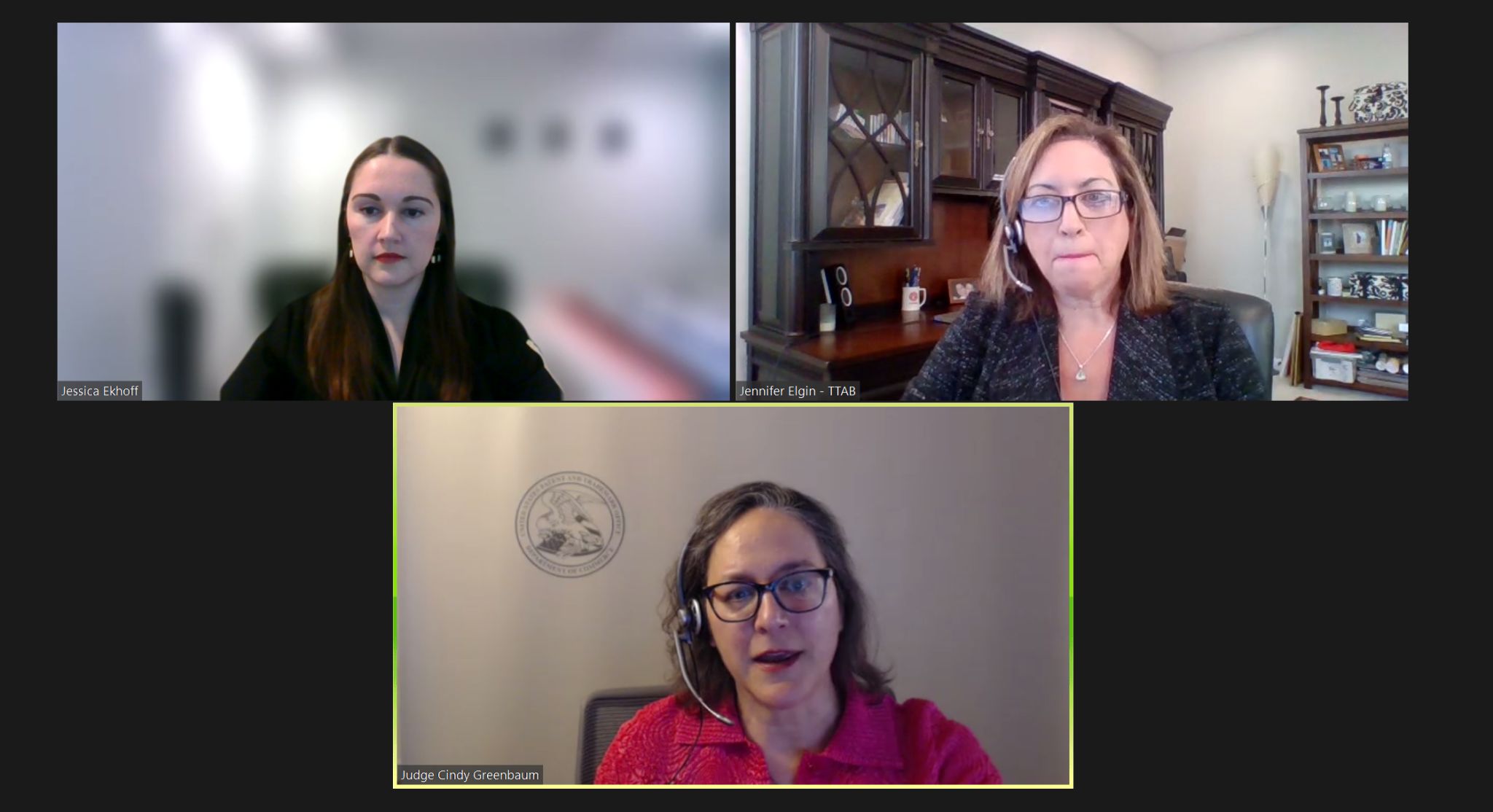
The third session, the PTAB Fireside Chat, included Deputy Chief Judge Jacqueline D. Wright Bonilla, Patent Trial and Appeal Board, and was hosted by Julianne M. Hartzell, Marshall, Gerstein & Borun LLP. The discussion can be summarized as follows: Deputy Chief Judge Bonilla discussed new initiatives offered by the PTAB, including a program that provides foundational information to people brand new to the PTAB, including inventors, as well as the Legal Experience and Advancement Program (“LEAP”) program, which gives 15 more minutes of oral argument time to each party represented by a LEAP attorney. Other topics discussed included statistical studies related to patent petitions, options that parties have upon rehearing, discretionary denials under 35 U.S.C. § 325(d), and fast-track appeals.
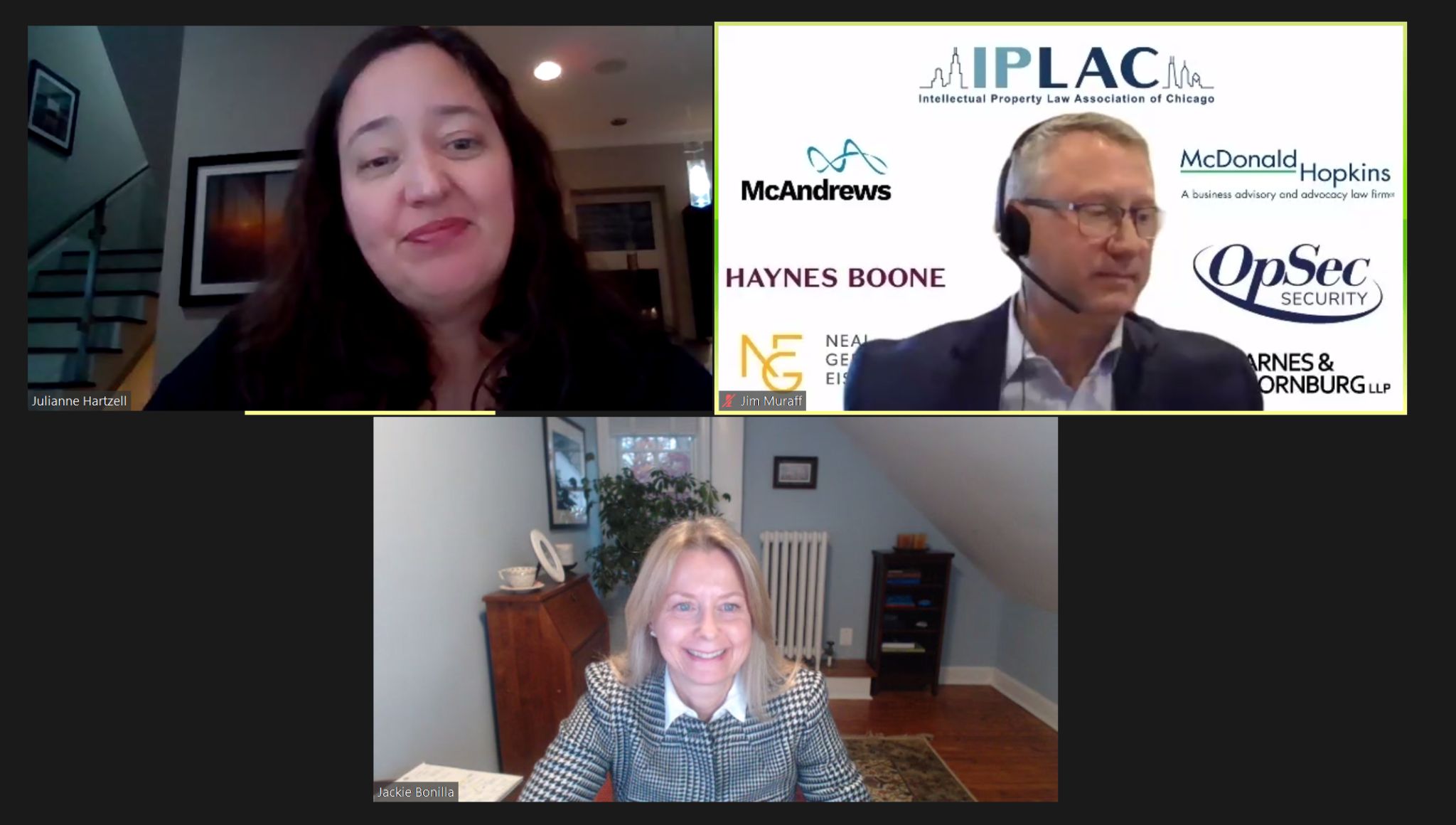
The last session, the Federal Court Panel, included Judge Sharon Prost, U.S. Court of Appeals for the Federal Circuit; Chief Judge Rebecca R. Pallmeyer, U.S. District Court for the Northern District of Illinois; and Judge Matthew F. Kennelly, U.S. District Court for the Northern District of Illinois, and was moderated by Stephen Rosenfeld, McDonald Hopkins LLC. The discussion can be summarized as follows: the judges expressed their views on how the pandemic has affected federal court practice. The judges also described the claim construction process, and explained why having claim construction occur in later stages after discovery is beneficial. Fully aware of how complicated patent cases are, judges typically provide jury instructions at the beginning of trial and at the end of trial. The judges reminded the audience that they do not have science degrees, and the onus is on the lawyer to describe the invention in a clear and understandable manner. When writing briefs, the judges recommended to carefully construct the introduction, and write about complicated subject matter in a very clear way – if judges need to read a paragraph more than once, the paragraph is not clear enough. Sometimes, judges do not have time to read the appeal fully even once, so even carefully describing the Table of Contents effectively goes a long way.
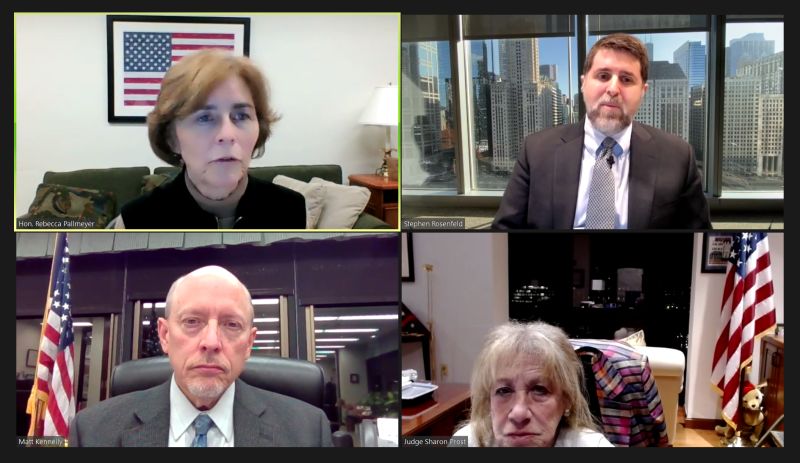
6. Speed Networking Sessions
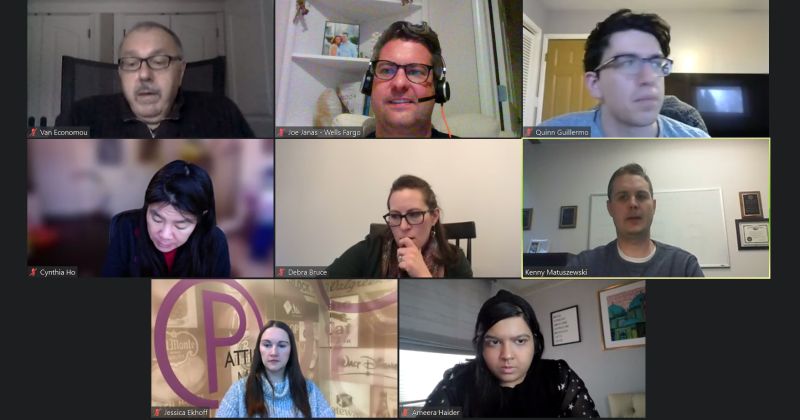
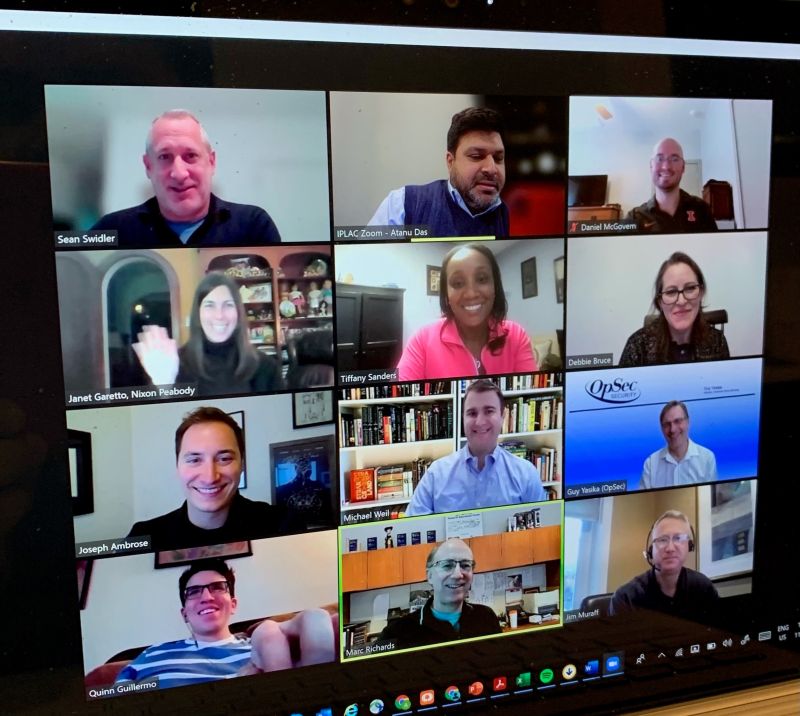
The IPLAC Board hosted four “Speed Networking” sessions on October 27, November 17, November 23, and December 9. The sessions were hosted by IPLAC Board Members Karen Hwang and Brian Verbus, Chief DEI Officer Atanu Das, and Secretary Joe Janas. The events provided an opportunity for members to meet and connect with other members of the Chicago IP community.
7. Trade Secrets Summit, Part 2 – December 13, 2021
On December 13, 2021, the Trade Secret and Unfair Competition Committee convened Trade Secrets Summit – Part 2. Two panels of practitioners discussed transactional aspects of trade secret law and practice. The first panel included Tim Oliver of Grogan, Hesse & Uditsky, Josh Rich of McDonnell Boehnen Hulbert & Berghoff, and Honeyeh Zube of McDonald’s Corporation, moderated by Olivia Luk Bedi of Neal, Gerber & Eisenberg. The panel discussed trade secrets in the non-employee context, including when and how to use non-disclosure agreements for joint ventures, best practices on how to counsel clients on identification of intellectual property for patent or trade secret protection, and how to catalogue your trade secrets and keep them protected. The second panel included Bill Beckman of Progress Rail and Debbie Berman of Jenner & Block, moderated by April Otterberg of Jenner & Block.
The panel addressed trade secrets in the employee context focusing on the current environment posing risks for the protection of trade secrets, including in light of remote work or hybrid remote work situations, how to protect trade secrets and confidential information within and among a company’s own employees, and the changing legal landscape for the use of restrictive covenants in employment agreements.
Special Feature: Get to Know IPLAC DEI Committee Co-Chair Caleb Norris

Caleb Norris is Co-Chair of IPLAC’s Diversity Equity and Inclusion (“DEI”) Committee and the CBA’s Civil Rights Legislative Liaison for young lawyers. By day, Caleb is an intellectual property attorney focusing on prosecution and trademark enforcement at IP-Horgan LTD. Before IP-Horgan, Caleb worked with a civil rights firm working on police misconduct cases, and public interest and civil rights remains a big interest of Caleb’s.
Caleb’s pursuit of intellectual property law came as a merger of his longstanding interests in both fine art law and public interest. During his first two summers in law school, Caleb worked in federal Indian law, working with the Tribal Law and Policy Institute in Los Angeles and then the Native American Rights Fund in Boulder. While at the Native American Rights Fund, Caleb had the opportunity to work on indigenous intellectual property proposals for the World Intellectual Property Office, where he saw the intersection of Intellectual Property law and Civil Rights law, and how preserving underrepresented groups’ intellectual property could really help bolster those communities.
Caleb describes the DEI Committee as having two main focuses: “The first is how to promote DEI in the legal field. For example, IPLAC’s recent efforts – led by board member Atanu Das – resulted in the successful launch of a new directive with five local Chicago law firms where hours spent doing certain approved DEI measures will count towards billable hour requirements.”
Caleb describes the second focus as being over how IP and civil rights law play together. The Committee is hoping to have a CLE course set up for next semester that will discus cultural appropriation. Until then, the DEI Committee often ends its bi-weekly meetings discussing a topic related to the intersection of DEI and IP, such as stories of indigenous creators who have had their works effectively stolen, often to great commercial success, without any economic benefit going to the people from whom the creative work originated. For example, retailer Urban Outfitters recently settled with the Navajo Nation over use of their patterns and designs. “This has led to Urban Outfitters not only paying the settlement, but now trying to partner with the Navajo for future collaborations.” Similarly, retailer Madhappy sold sweatshirt designs derivative of the Navajo seal. “The ideas central to these cases even extend into the issue of Native American mascots and the use of caricatures of cultures as symbols.”
This issue is one that is particularly close to Caleb, as he wrote his law school thesis on it – specifically the gaps in fashion law, and the effect on underrepresented communities. “In the United States, a specific clothing design generally cannot receive copyright protection. In rare instances, there are only limited options for getting protections in the form of a trademark or design patent. So due to how copyright law in the U.S. functions, Native American communities do not have a great path to protect their classic heritage designs. And the limited paths that exist come with massive barriers to entry like legal fees.”
For anyone who has not had the chance to attend a DEI event but is considering, Caleb shares this message:
“Diversity, equity and inclusion is something that had the world at its heels last summer and it was something that everyone was hyper focused on and hyper involved in. I think despite the best efforts those who are most committed it, it can fall by the wayside as the world starts to move back to normal and other topics start to take back space in the news. The goal of our committee is to keep diversity, equity, and inclusion – in both the legal field as a whole and IP – a fluid conversation. One that does not necessarily feel like we are forcing it, preaching about it, or espousing ideas for how we think people should treat it. In our events, this means productive, safe, constructive conversations about diversity, equity and inclusion within the boundaries of whatever our event is. This means we welcome all people, no matter what their opinions are, what their background is, what their thoughts are on the subjects, to come and join us and try to take part in a comfortable environment where you do not need to put your usual shields up. This way it becomes less of an imposition from someone telling you what you should care about.”
If you are interested in reading more about the DEI Committee, see our recent feature on Atanu Das here, and keep an eye out for the DEI Committee’s regular book and film discussions.
Special Feature: Get to Know IPLAC Litigation Committee Vice-Chair David Donoghue

David Donoghue is Vice Chair of IPLAC’s Litigation Committee. He is a technology litigator and Holland and Knight, where he focuses on litigation in patents, trade secrets, and trademarks, and where he is the head of the firm’s IP Group.
David joined IPLAC recently at the request of Leif Sigmond, to help Leif reinvigorate the Litigation Committee – and reinvigorate they have! The Litigation Committee has been among the more active committees in recent months, hosting several significant events.
David explains his approach to rethinking this committee: “One of the great things about IPLAC is that it brings you into a community with IP practitioners across Chicago. We wanted this committee to better reflect the friendships within that community, and to help grow them for others as well. We reached out to people we respected within the Chicago IP litigation community and asked them for ideas on what sort of content mattered most to them. What sort of events they would be most interested in attending.”
David, Leif, and the Litigation Committee ended up putting together several presentations, like the damages seminar, on which the dynamic Judge Alan Albright of the Western District of Texas served as a main panelist. They also received an invitation from Chief Judge Rebecca Pallmeyer of the Northern District of Illinois to put on a program in connection with the court around teaching patent litigation to the district’s law clerks. “That was a really dynamic, exciting program. I was thrilled to play a role in it, and for our committee to have been able to help the court better understand and address patent litigation at the district level. We look forward to making it an annual event.”
David values creating opportunities for both learning and networking through the committee and finds that so far, learning has been the easier function to target, with remote work making it easier to pop into a seminar. But both learning and networking are core to IPLAC, and thus core to the Litigation Committee.
To any young attorneys and law students interested in pursuing IP litigation, David advises getting down to the courthouse. “You have a great resource right here in Chicago. We have one of the busiest IP courts in the country for both patent and trademark claims, and there is far more copyright litigation in Chicago than one might expect. That means you have the opportunity to go see it and learn from it. The courts are right there for you to experience.” David also advises getting involved in IPLAC. “Do the networking! Go to the golf outing where you get to spend hours with practitioners. Go to the events and learn, ask questions, introduce yourself. Showing other practitioners how much you care makes a powerful impression – more meaningful than almost anything you can do in a half-hour interview.
If you’re interested in getting involved, now is a great time to join the Litigation Committee. “We have great momentum because practitioners have gotten involved. We need you to carry that momentum forward so we can keep growing.”
